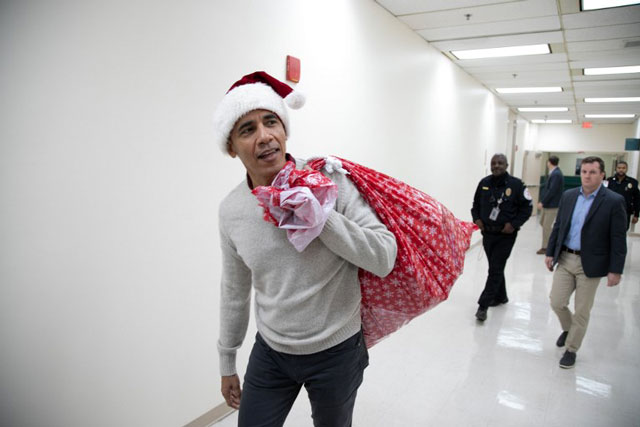
BEIJING | Xinhua | Another Christmas has come and gone, replete with families and friends exchanging gifts beside a crackling hearth, sharing stories under a Christmas tree and enjoying traditional holiday meals. Others weren’t so fortunate, receiving church handouts, curling up in a subway station to avoid the cold or grieving the loss of beloved ones killed by gun violence.
The happiness and sorrow of humankind are not related – such a sad truth has been magnified, particularly in the West during this Christmas season, when the mounting pressure of life for ordinary Americans and Europeans is under the microscope.
Amid dogged inflation and rising insecurity, many ordinary people in the United States and Europe were hardly in a holiday mood, with businesses in great need of shoppers against a bleak economic backdrop.
“EVERYTHING IS GOING UP, BUT MY PAY ISN’T”
Jon Lauck is a lawyer and author from Sioux Falls, South Dakota. Christmas, with a lack of snow, seems rather strange for him and his wife. “It’s South Dakota. We usually have snow by now. Last year at this time, we had 40 inches,” he said.
Lauck also said that the couple’s appetite for gift-giving was also missing, adding he is still concerned inflation is a “real problem.”
“Sure, the (inflation) rate is going down, but it’s still increasing. All those increases have stayed, and there’s just less money at the end of this year even though we haven’t changed what we’ve been doing,” said the 52-year-old man.
The cost of living worried 41-year-old Nicole Garza, too. The mental health professional from San Antonio, Texas, has found almost everything to be more expensive over the past two years. “In Texas, the prices are going up, but my pay isn’t,” she said.
The U.S. Federal Reserve has kept pushing inflation levels lower with interest rate hikes and balance sheet reduction measures throughout 2023, but the index remains well above its long-term 2-percent target. The year-on-year decline in the Consumer Price Index has yet to pardon middle- and low-income Americans from a heavy economic burden, as prices remain unbearably high.
A recent survey by Bankrate found most Americans feel the U.S. economy is in tough shape and getting worse. Sixty percent of respondents in the lowest-income households, making under 50,000 U.S. dollars a year, said the economy feels like it is in a recession.
While some U.S. households could still manage to celebrate Christmas with a tightened belt, some others are preoccupied with a more pressing matter: survival. A recent report by the U.S. Department of Housing and Urban Development found the population of homeless people in the country rose 12 percent year-on-year in 2023 to around 653,000, the most since 2007. Those homeless Americans, as a study showed, were “16 times more likely to die suddenly than their peers.”
In San Francisco, hundreds of children waited for shelter before Christmas. The city’s largest emergency family shelter was already full, and around four families were forced to be turned away per night due to a lack of beds and food. “They’re in crisis. They’re desperate for help. It’s unconscionable,” said Paul Boden, executive director of the Western Regional Advocacy Project. “It’s absolutely ludicrous and disgusting.”
In interviews with The Associated Press and The Wall Street Journal, Jeff Olivet, executive director of the U.S. Interagency Council on Homelessness, pointed to the “shortage of affordable homes and the high cost of housing that have left many Americans living paycheck to paycheck and one crisis away from homelessness.”
“The domestic economy is filled with great anxiety,” Denis Simon, a distinguished fellow at the Institute for China-America Studies, told Xinhua.
Things were hardly less gloomy on the European continent. Eurostat said that although the eurozone’s annual inflation rate in November was down from that of October, inflation was still high for food, alcohol and tobacco products. “Rising living costs are putting a huge pressure on us … This situation is not normal,” complained Zagreb citizen Bozica Koscak, who planned a low-key Christmas.
Recent surveys showed nearly 75 percent of German households with low net incomes intend to economize on Christmas groceries, over 50 percent of British families are tightening their Christmas budgets due to the rising cost of living, and 37 percent of French people are concerned about being unable to buy Christmas gifts.
“There are so many more expenses that families have to deal with that they are being extra careful on how they spend the little they have left for Christmas,” said Maltese economist David Zahra.
IT’S THE MOST VULNERABLE TIME OF THE YEAR
When it rains, it pours. While hovering prices bite into Westerners’ purchasing power on the Christmas market, surfacing security incidents cast a giant shadow over the holiday cheer.
American soil was stained with blood again over the past holiday weekend. A shooting at a central Florida shopping mall on Saturday claimed the life of one man and injured several others. On Christmas Eve, one person was killed, and four others were injured in a shooting outside a Houston club; one person was killed, and three others were injured in a shooting at a Colorado mall; in Seattle’s Pioneer Square neighborhood, five people were injured in another shooting; and two patrons were injured in a shooting inside a Cincinnati bar. Additionally, at least 16 people were shot, three fatally, in gun violence across Chicago over the weekend.
U.S. society has long been crippled by gun violence. The intractable gun problem has folded into other persistent issues like racial tensions, illegal immigration and drug abuse. The latest data from the Gun Violence Archive website showed the number of gun violence deaths in the United States this year has topped 42,400.
“I was in a mass shooting a couple of weeks prior … It’s something that has been on my mind, but to live through it and see it happen with people I know. These were my people,” lamented Josh Hawkins, a photographer from Las Vegas.
According to the Gun Violence Archive, over 220 gun violence incidents took place across the country in the last 72 hours, killing more than 75 people and injuring over 160. Terror and grief mark the Christmas memories of the survivors and bereaved families.
The Palestinian-Israeli conflict exacerbated existing social rifts in America, triggering more hate crimes. The latest Reagan National Defense Survey showed that 70 percent of people believe the country is on the wrong path. Garza, the mental health professional, has been bothered by the amount of violence in the country. “I used to leave my doors unlocked. Now, I never do that.”
Christmas on the other side of the Atlantic lacked a holiday cheer. A 24-year-old student from Charles University in the Czech Republic shot and killed 14 people and injured 25 others last week before committing suicide. Saturday was declared a state mourning day by the government. Christmas markets in some Czech cities canceled or reduced their programs. In France, the lifeless bodies of four children, ranging from nine months to 10 years old, were found alongside their mother in their Paris apartment on Christmas Day.
Meanwhile, European authorities are on edge during this holiday season, given the recent rise in anti-Semitic and Islamophobic attacks since the escalating conflicts in the Middle East. In Cologne, Germany, two teenagers were arrested on charges of planning an attack on a Christmas market or synagogue, and sightseeing visits were barred at the city’s landmark cathedral.
Quoting ForwardKeys, a flight bookings analysis company, Reuters reported that “there was a slight spike in ticket cancellations over the Christmas period between Dec. 21-31, from 2.4 percent to 3 percent since Nov. 24.”
“With the war between Israel and Hamas and the polarization it causes in our society, with the upcoming holiday season, there is a huge risk of terrorist attacks in the EU,” European Commissioner for Home Affairs Ylva Johansson cautioned earlier this month.
As the year ends, the contrasting narratives of celebration and struggle during this holiday season highlight the ongoing challenges of inequality, hardship and conflict. Amidst the festive spirit, calls to address these pressing issues should be more pronounced. ■
 The Independent Uganda: You get the Truth we Pay the Price
The Independent Uganda: You get the Truth we Pay the Price




